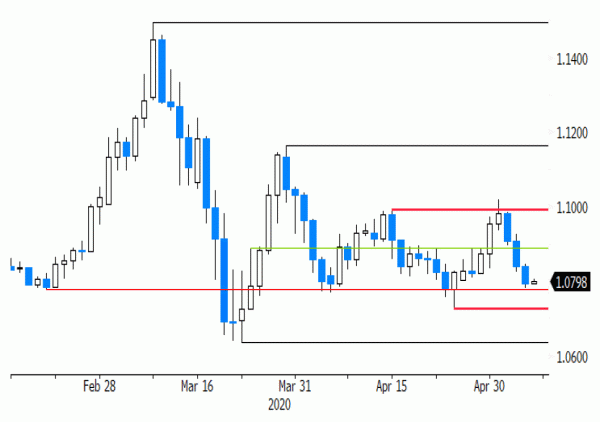- Rates: Supply-driven steepening
An unusual syndicated German bond sale (15y) and the US Treasury’s quarterly refunding statement caused bear steepening of German and US yield curves. The focus on supply could remain in absence of other market themes while the (in)visible hands of central banks risk capping such moves. - Currencies: Institutional uncertainty continues to pressure the euro
EUR/USD drifted further south to the 1.08 area as markets ponder the consequences for Tuesday German court ruling for ECB monetary policy and for the EU institutional framework all together. This uncertainty probably won’t disappear soon. In the UK, markets look out for first steps of easing of the lockdown, but for now we don’t expect it to trigger big sterling gains.
The Sunrise Headlines
- US equities lost about 1% amid dire economic data and lingering uncertainty. Big tech kept the Nasdaq slightly in the green however. Most Asian markets decline. Japan loses 0.3% after returning from holidays.
- The Bank of England kept rates at 0.10% this morning and sees rates this low through 2021 as the post-corona recovery is likely to be slow. The bond buying program size is left at £645bn. Two members voted for a £100bn increase.
- Chinese export surprisingly rose 3.5% after a -6.6% decline due to the coronavirus. Imports tumbled -14.2% though. The country’s Caixin services PMI rose only marginally to 44.4 in April, less than the expected rebound to 50.1.
- President Trump said he will be able to judge next week whether China is fulfilling the phase one trade deal. He threatened to end the agreement should he consider China falls short of its promise to buy $200 bn more in US goods.
- The Polish presidential elections are set to be postponed after the ruling PiS party withdrew their legislative attempts to push through the original date of May 10 after its junior coalition partner said it will not back the bill.
- Despite an acceleration in Covid-19 infections, Russian President Putin supported a proposal to reopen businesses on May 12. A poll showed the coronavirus has toppled his approval ratings to the lowest in 20 years.
- Today’s economic calendar contains US jobless claims. The Czech National Bank and the Norgesbank hold policy meetings. A slew of Fed speeches is due. Spain and France tap the bond market.
Currencies: Institutional Uncertainty Continues To Pressure The Euro
Institutional uncertainty weighs on euro
EUR/USD remained on a downward path yesterday. Uncertainty on the consequence of Tuesday’s German Court ruling on the ECB PSPP, still pressured the euro. Poor German orders, a pessimistic assessment on the intra-EMU economic developments in the EC spring forecast and underperforming European equities also weighed. EUR/USD dropped below 1.08 and hovered near the intraday lows to close at 1.0795. Recent yen outperformance persisted even as US yields rose. USD/JPY finished the day at 106.12.
This morning, Chinese foreign trade data printed much stronger than expected with exports rising 8.2% (in CNY) versus (-14.1% expected). Imports decline less than feared. For now, the impact on markets is limited. Markets probably consider the trends as not sustainable. The yuan remains in the defensive, probably as markets await the outcome of the recent US-China trade spat (USD/CNY 7.0975 area). Australia even reported a record trade surplus, partially due to strong demand from China (iron ore). The Aussie dollar gains a few ticks (0.6420 area). USD/JPY is looking for a bottom in the 106 area.
Today, the US jobless claims are interesting but didn’t move FX much of late. March production data from EU countries probably won’t bring much ‘new’ news. Uncertainty on fall-out of the corona crisis on the EU institutional framework probably remains a euro negative short-term. The EUR/USD decline after the German court ruling continues. The bottom of the 1.0727/1.1018 range is coming within reach and a test might be on the cards. The 1.0636 March correction low is next technical reference. This is mainly euro weakness rather than USD strength.
Sterling again couldn’t really gain against a weak euro yesterday. An early test of EUR/GBP 0.87 support was again rejected and the pair closed at 0.8757. At time of writing, the BoE announces to keep rates unchanged. A negative economic forecast might pave the way for more easing (QE) later. Markets will also closely monitor the debate on a gradual restart of the UK economy (to be announced on Sunday) with some potential easing of restrictions. For now, we don’t expect it to provide a trigger to push EUR/GBP below the 0.8685/0.87 support.
Economic and institutional uncertainty is pushing EUR/USD toward the 1.0727 range bottom.

